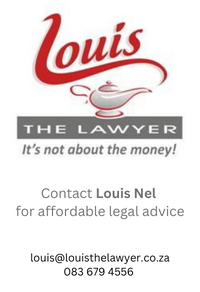Louis the Lawyer: What You Can’t Trademark – And Why It Matters: Keywords (Part Two)
INSERT #8
Supplied by Adv. Louis Nel (Louis The Lawyer)

What Are Keywords?
Keywords are commonly used in platforms such as Google AdWords and Amazon as part of search engine optimisation (SEO). While there are benefits for both buyers and sellers, the impact on trade marks is less often discussed – but it’s no less important.
What Do Google and Amazon Do?
Both platforms use algorithms to match keywords with products or services, applying keyword matching options to display the most relevant results.
What Do Sellers and Advertisers Do?
Sellers and advertisers may use trade marks owned by third parties as so-called keywords. On Google, for instance, they typically pay only when their advert is clicked on – a model known as ‘pay-per-click’.
This practice can lead to increased visibility and sales for sellers, while buyers benefit from a more tailored and convenient shopping experience.
Trade Mark Policies of Google and Amazon
Both Google and Amazon have detailed policies regulating the use of trade marks in advertising. These policies cover content, format, and other aspects. For the purpose of this article, we’ll focus specifically on the trade mark implications:
Google regards the unauthorised use of a trade mark in advertising as a policy violation.
Amazon requires sellers to have explicit permission from the trade mark owner. The platform also excludes brand names that have become generic terms for a product, such as Xerox or Hoover. In addition, Amazon offers a Trade Mark Registry, allowing trade mark owners to list their marks and strengthen their protection on the platform.
Case Law Insights
International courts often assess keyword trade mark issues through the lens of the likelihood of confusion (see my previous article). A landmark case in this regard is Marks & Spencer vs Interflora (UK), in which Marks & Spencer used the term Interflora without the knowledge or approval of the well-known florist brand.
The court found that “the reasonably well-informed and reasonably observant Internet user could not necessarily discern from the advertisements concerned that M&S was not part of the Interflora network.” As a result, the court ruled in favour of Interflora.
South African Case Law
A relevant local case is M-Systems v Cochrane Steel (Gauteng High Court, 2014), where the dispute centred on M-Systems’ use of the keyword Clearvu – a term associated with Cochrane. The court echoed the Interflora judgment, holding that the use of a competitor’s trade mark as a keyword is acceptable unless it causes confusion. In this instance, the court found no such confusion.
However, it is important to note that at the time of judgment, Cochrane’s application to register Clearvu as a trade mark was still pending. As such, the matter of using registered trade marks as keywords remains open to legal interpretation.
Final Considerations
Each case must be evaluated on its own merits. The examples referenced above should not be treated as universal precedents or “blueprints.”
It could also be argued that an advertiser who fails to comply with Google and Amazon’s policies would not only be in breach of those policies, but could face difficulty defending against a trade mark infringement claim.
BLOG: louisthelawyer.wordpress.com
TWITTER: @louisthelawyer





















